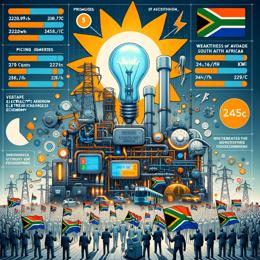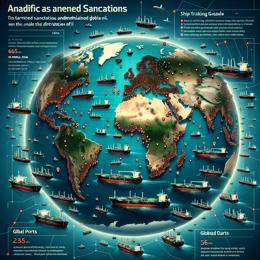Image created by AI
Cape Town Mayor Advocates Against Eskom’s 44% Electricity Tariff Hike
Cape Town’s civic leadership, spearheaded by Mayor Geordin Hill-Lewis, has taken a firm stand against Eskom's proposed 44% electricity tariff hike, which they argue is based on unstable financial data and unfairly burdens the South African public. During the public hearings held in Cape Town on November 18, 2024, the city's objections were strongly voiced, highlighting the broader implications for South Africa’s fragile economy.
Eskom’s proposal, aimed at increasing tariffs for municipalities and direct customers in the 2025/26 cycle, has drawn severe criticism from many quarters, including Cape Town's local government. Mayor Hill-Lewis, in his submissions to the National Energy Regulator (Nersa), demanded transparency in Eskom’s financial projections and criticized the substantial intended profit increase on electricity generation assets amid economic challenges faced by households and businesses across the country.
The City’s critique extends to three major points of contention. Firstly, they question the accuracy and completeness of Eskom's financial data, pointing out that the projected 10% drop in sales volumes contradicts the stabilizing sales due to absent load-shedding. Furthermore, there is a lack of detailed justification for the operating costs increase to R40.8 billion, claimed by Eskom as a more realistic cost reflection.
Secondly, Cape Town’s administration accuses Eskom of penalizing consumers for inefficiencies in Independent Power Producers (IPPs) and costly coal contracts, which do not meet energy requirements nor incorporate penalties for underperformance. Such practices paint a concerning picture of resource management within Eskom.
Lastly, the attempted tripling of profit from electricity generation assets by Eskom, according to the mayor, does not align with the state-owned entity’s duty to prioritize public good over financial gain.
In response to these challenges, Cape Town is proactive in exploring alternative energy sources and is investing significantly in grid upgrades to facilitate a more decentralized and diverse energy future. This includes a substantial R4 billion investment earmarked for enhancing the electricity grid over the next three years.
Meanwhile, Cape Town also champions a progressive lifeline electricity tariff, which has been adjusted over the past years to alleviate the financial burden on lower-income households. This tariff structure, underpinned by comprehensive cost-of-supply studies, contrasts with the lack of detailed financial justification in Eskom’s tariff application.
The city, boasting the highest proportion of residents benefiting from free basic water and electricity services compared to other metros, remains committed to protecting its citizens from unsustainable cost increases, potentially setting a precedent for other municipalities grappling with similar issues.
As the debate unfolds, the outcome of Nersa's decision on Eskom's tariff application will be pivotal not only for Cape Town but for South Africa's economic competitiveness and consumer welfare.










